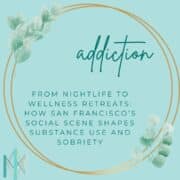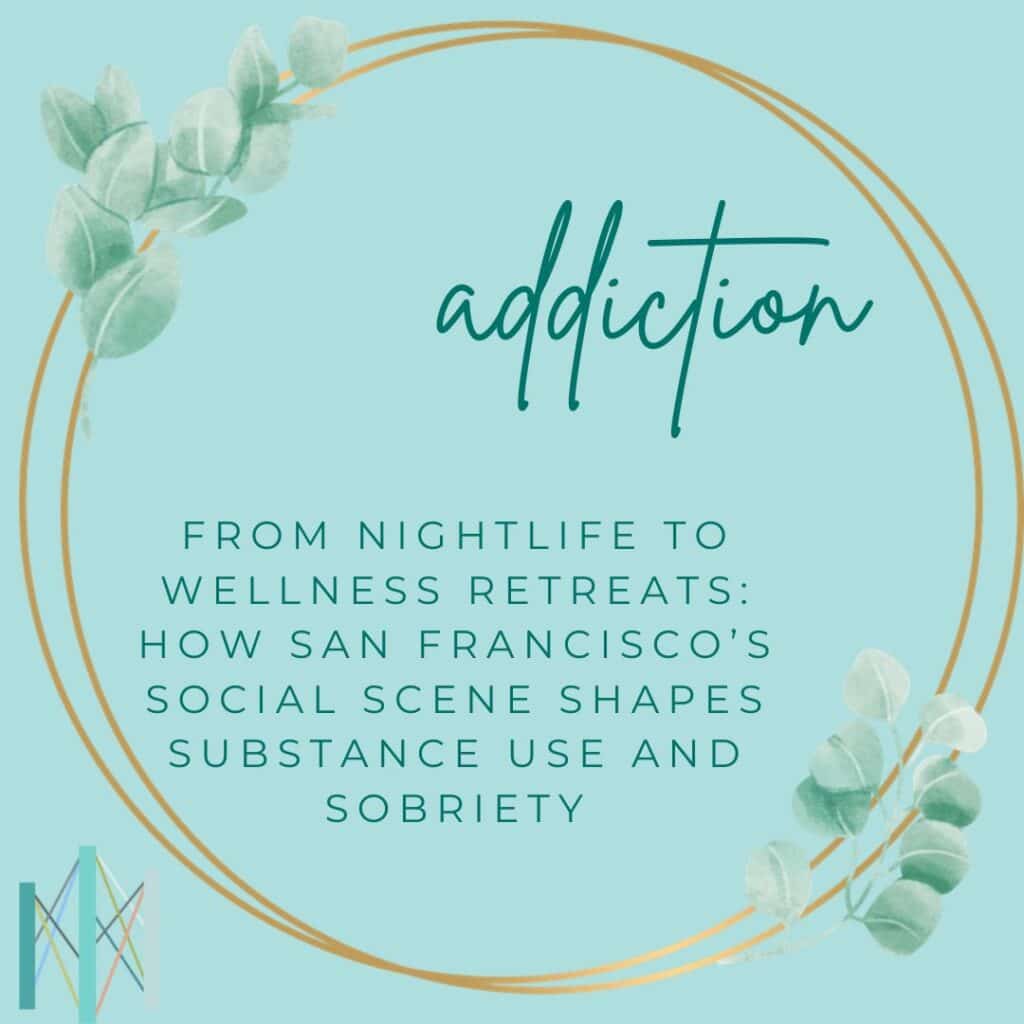

San Francisco has long been a city of contrasts—tech innovation alongside counterculture movements, fast-paced nightlife alongside serene wellness retreats. It’s no surprise that in this dynamic environment, attitudes toward substance use, sobriety, and recovery are equally diverse. For many, San Francisco offers opportunities for self-exploration and healing. For others, the same scene can contribute to patterns of overuse or dependency.
But in this city, recovery is not a one-size-fits-all journey. Whether you are reevaluating your relationship with alcohol, exploring the role of psychedelics in healing, or seeking a life free from compulsive patterns, therapy can help you navigate your path without judgment.
Browse our Therapist Directory to Find a Therapist Today
The Intersection of Culture, Connection, and Substance Use
In a city where self-expression and experimentation are celebrated, substance use often intersects with community, culture, and personal growth. From social rituals to wellness practices, people engage with substances in ways that can be joyful, healing, or, at times, harmful. Exploring these intersections can help you better understand your relationship with substance use and decide what balance looks like for you.
Nightlife and Party Culture
San Francisco’s nightlife has a storied history, from the psychedelic rock era of the ‘60s to today’s thriving DJ, rave, and festival scene. Here, substances like alcohol, MDMA, and ketamine often accompany social experiences. For many, these spaces foster connection, joy, and creativity. Yet, they can also become spaces where boundaries blur, and overuse takes hold.
Substance use in nightlife settings can sometimes escalate into dependency, particularly with substances like alcohol or stimulants that are deeply embedded in social rituals. The accessibility of psychedelics, such as ketamine or LSD, which some explore for personal growth or healing, can also lead to misuse outside of therapeutic settings.
Behavioral addictions can emerge within these spaces as well. The nightlife scene, with its focus on social validation and digital sharing, can contribute to compulsive behaviors around social media use—chasing likes, shares, and connections well beyond the dance floor.
Sexual addiction can also intersect with nightlife, as the freedom and fluidity of party culture sometimes encourage risk-taking, blurred boundaries, or patterns of compulsive sexual behavior that may feel difficult to manage.
Meanwhile, tech addiction often fuels and extends the nightlife experience—through dating apps, party livestreams, and social media engagement that blurs the line between online and in-person experiences. Constant connectivity can heighten the pressure to stay visible, relevant, and socially engaged, contributing to digital burnout alongside substance or behavioral dependencies.
In San Francisco, where nightlife and wellness often overlap, the lines between exploration and escapism can become complex. Therapy offers a non-judgmental space to explore these intersections, helping you understand your relationship with substances, behaviors, and social patterns, and guiding you toward a balance that aligns with your well-being.
Wellness and Healing Spaces
San Francisco is not only known for its vibrant nightlife but also for its deep roots in wellness culture—a legacy that stretches back decades. The Bay Area was a key player in the Human Potential Movement of the 1960s and 1970s, which brought therapeutic practices such as Gestalt therapy, encounter groups, and meditation into mainstream consciousness. These movements emphasized self-exploration, holistic healing, and the mind-body connection—values that continue to shape the city’s wellness landscape today.
Today, yoga studios, sound baths, and retreats centered on sobriety and self-exploration are everywhere. Many people find community in sober social events, alcohol-free bars, or wellness retreats focused on self-care and connection. This wellness culture offers an alternative to substance-centered socializing and provides pathways to healing that are deeply rooted in therapeutic traditions.
The Bay Area has also been at the forefront of integrating psychedelic therapies into wellness practices. Psychedelics, such as ketamine and psilocybin, which once defined the counterculture era, are now being explored in clinical and therapeutic settings to treat conditions like depression, PTSD, and substance use disorders. Local organizations and research centers are pioneering studies on the therapeutic benefits of these substances, contributing to a growing understanding of their potential for healing when used intentionally and in safe settings.
Additionally, San Francisco’s wellness scene often intersects with recovery communities. Sober events, such as dance parties and outdoor adventures, are part of a broader movement toward redefining social connection without substances. In these spaces, recovery is seen not as an end to something but as the beginning of a more connected and fulfilling life.
Therapists in San Francisco often draw from this rich history, incorporating holistic and evidence-based practices into their work. From somatic therapy and mindfulness-based approaches to trauma-informed care and psychedelic-assisted psychotherapy, local therapists understand how wellness practices can support both recovery and self-exploration. Whether you’re navigating behavioral patterns around substance use or exploring new ways to connect with yourself and your community, therapy can help you integrate wellness practices into your healing journey.
The Rise of Psychedelics in Healing
San Francisco is at the forefront of the modern psychedelic renaissance, carrying forward a legacy that began with the countercultural movements of the 1960s and 1970s. Today, psychedelics such as psilocybin (magic mushrooms), ketamine, and MDMA are being explored in therapeutic settings to address trauma, depression, anxiety, and addiction. As laws and perceptions shift, the Bay Area has emerged as a hub for both clinical research and alternative healing approaches, blending cutting-edge science with a spirit of exploration and openness.
Psychedelic-Assisted Therapy and Its Role in Healing
Psychedelic-assisted therapy is a therapeutic approach that combines talk therapy with the use of psychoactive substances to promote deep emotional and psychological healing. This modality is particularly promising for people who have not found relief through traditional therapies, such as cognitive behavioral therapy or antidepressant medications. In San Francisco, where innovation in mental health care is embraced, many clients are interested in working with therapists who can integrate psychedelic-assisted practices into their work, often in collaboration with psychiatrists or specialized clinics.
Clients may be interested in:
- Ketamine-Assisted Psychotherapy (KAP): Among the most accessible forms of psychedelic therapy, ketamine-assisted psychotherapy is currently legal and widely offered in San Francisco. Ketamine, originally developed as an anesthetic, has been shown to rapidly reduce symptoms of depression, including suicidal thoughts, making it a vital option for those with treatment-resistant depression. In a therapeutic setting, ketamine can help individuals access repressed emotions, reduce anxiety, and gain new perspectives on trauma or addiction.
- Psilocybin Therapy: Though still in the research phase and not yet legal outside of clinical trials, psilocybin-assisted therapy has shown promising results for depression, end-of-life anxiety, and substance use disorders. The Bay Area is home to organizations and research centers leading the way in psilocybin research, offering hope for future therapeutic access.
- MDMA-Assisted Therapy: Particularly effective in treating PTSD, MDMA-assisted therapy combines psychotherapy with the empathogenic effects of MDMA, helping clients process traumatic experiences with reduced fear and heightened emotional openness. While awaiting full FDA approval, the Bay Area remains a key player in research and advocacy for MDMA therapy.
Legalities of Psychedelic-Assisted Therapy
As research into the therapeutic potential of psychedelics continues to expand, so too does the legal landscape. While ketamine-assisted psychotherapy (KAP) is currently the only legally available psychedelic therapy in California, there is growing advocacy and clinical research aimed at making treatments such as MDMA- and psilocybin-assisted therapy more widely accessible.
Our therapists stay informed of these developments and strictly comply with current laws and regulations. If you are exploring the role of psychedelics in your healing journey, our team can help you understand your options and provide psychedelic integration therapy to process your experiences. For now, KAP remains the only legally permitted psychedelic-assisted therapy in California, and it is available through licensed providers for conditions such as depression, anxiety, and trauma.
Psychedelics and Addiction Treatment
Psychedelics are increasingly recognized for their potential to address both behavioral and substance addictions. Unlike conventional treatments, which often focus on managing symptoms, psychedelic therapies work at a deeper, experiential level, helping individuals access insights and emotions that can drive lasting change.
Research has shown that substances such as psilocybin and ketamine can disrupt compulsive thought patterns, reduce cravings, and foster a renewed sense of purpose. These therapies work by enhancing neuroplasticity—the brain’s ability to form new connections—allowing individuals to break free from ingrained habits and self-destructive cycles. The introspective nature of these experiences often leads to emotional breakthroughs, helping clients confront the root causes of their behaviors, such as trauma, anxiety, or unresolved grief.
For those struggling with tech addiction, alcohol use, sexual compulsivity, or other behavioral patterns, psychedelic-assisted therapy offers the opportunity to see their relationship with these behaviors from a new perspective. By reducing mental “loops” of craving or avoidance and promoting self-compassion, these therapies can be powerful tools for change.
Additionally, San Francisco therapists often incorporate integration therapy into their practice—a type of talk therapy designed to help clients process and make meaning of their psychedelic experiences, experiences that may take place outside of the therapeutic session without the presence of the therapist. Integration sessions can involve journaling, guided reflection, or expressive arts, all aimed at helping clients translate insights from their journeys into actionable steps for their lives. For example, someone who has experienced a sense of oneness or self-compassion during a session might work with their therapist to explore how they can carry that feeling into their relationships or self-care routines.
While psychedelic-assisted therapy holds great promise, it is most effective when paired with ongoing support and reflection. Integration therapy bridges the gap between insight and action, supporting long-term healing and personal growth.
Therapists in the Bay Area offer a non-judgmental space to explore your relationship with psychedelics—whether you are considering psychedelic-assisted therapy, seeking support for integration, or exploring alternative healing modalities. By combining evidence-based therapies such as Internal Family Systems (IFS), somatic therapy, and mindfulness with psychedelic integration, therapists help individuals process insights, address trauma, and develop healthier coping mechanisms.
Reimagining Sobriety in San Francisco
In a city known for pushing boundaries, sobriety is no longer seen only as abstinence. People are redefining what it means to have a “healthy relationship” with substances—whether that means harm reduction, mindful use, or full sobriety. San Francisco’s unique history with both addiction and recovery—from the AIDS crisis and harm reduction advocacy to the city’s many 12-step communities—has fostered an environment where multiple pathways to healing are welcomed and respected.
- The Sober Curious Movement: Many are exploring life without alcohol—not necessarily because they identify as having a problem, but to experience life without the influence of substances. Alcohol-free bars and sober social events are thriving, offering spaces where connection and celebration don’t revolve around drinking.
- Mindful Use Practices and Harm Reduction: Rooted in harm reduction principles that have long been central to San Francisco’s public health efforts, some individuals are choosing to use substances more intentionally. Rather than focusing solely on abstinence, harm reduction approaches help people manage their use in ways that reduce risk and support well-being. Therapists play a key role in harm reduction, helping clients explore their relationships with substances, understand their triggers, and set healthy boundaries.
- Integration Therapy for Psychedelic Experiences: As interest in plant medicines and psychedelics grows, more people are turning to therapists to help process and integrate their experiences for deeper healing. Integration therapy helps individuals unpack the insights gained during psychedelic journeys and apply them to their lives, whether their goal is to reduce cravings, heal trauma, or cultivate self-compassion.
San Francisco has long been a city where recovery, experimentation, and personal growth intersect. Whether your path involves abstinence, moderation, or exploration, therapy offers a nonjudgmental space to help you define and pursue your version of well-being.
How Therapy Supports Your Unique Path
Therapy can help you:
- Explore Your Relationship with Substances: Without judgment, therapy offers a space to reflect on your habits, values, and goals.
- Address Underlying Emotions and Patterns: Substance use can sometimes mask anxiety, trauma, or loneliness. Therapy helps you unpack what’s underneath.
- Support Integration from Psychedelic Experiences: If you’ve had a transformative experience through a retreat or psychedelic journey, therapy can help you process insights and integrate them into your life.
- Develop New Coping Strategies: Whether your goal is to reduce use, abstain, or explore sobriety, therapy offers practical tools for managing triggers and cravings.
- Build a Supportive Community: Navigating change is easier with support. Therapy can help you connect with local sober or recovery communities that align with your values.
A City of Possibilities, A Space for Your Healing
San Francisco is a place where exploration and healing coexist. Whether you’re stepping away from nightlife, exploring wellness spaces, or integrating a psychedelic journey, your path to a healthier relationship with yourself—and substances—is uniquely yours.
Our San Francisco-based therapists understand the local culture and can help you navigate your journey without stigma or judgment. If you’re ready to explore your relationship with substances, sobriety, or mindful use, we’re here to support you.
Contact us today for an appointment or browse our therapist directory to find the therapist who is right for you.





